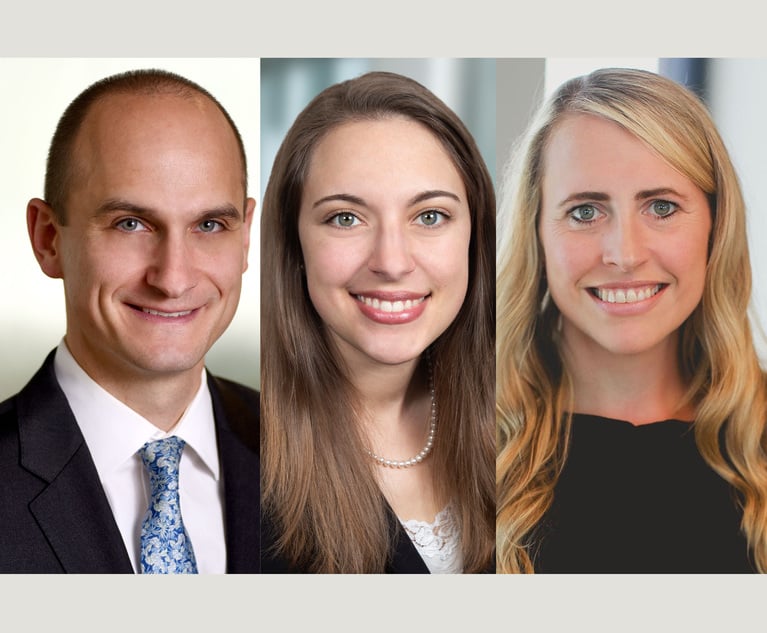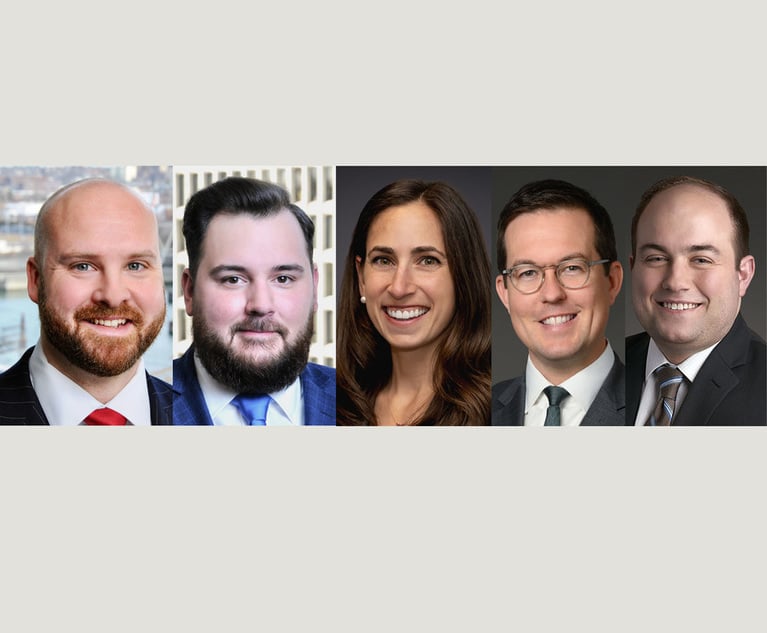 Associate Connecticut Supreme Court Justice Andrew McDonald. Courtesy photo
Associate Connecticut Supreme Court Justice Andrew McDonald. Courtesy photoCommunity Stakeholders Urged to Take Seat at Table in Search for New Chief State's Attorney
Recruiters are encouraging community stakeholders, including local police chiefs, the NAACP and the ACLU to provide input on who should be the Connecticut's next chief state's attorney after Kevin Kane steps down on Nov. 1.
September 10, 2019 at 06:43 PM
3 minute read
As Connecticut gears up to hire its next chief state's attorney, the commission in charge of the process will—for the first time—include community stakeholders in the recruitment effort.
Those stakeholders, Associate Supreme Court Justice and Criminal Justice Commission Chairman Andrew McDonald said, will play a vital role in giving their input on what qualities they'd like to see in the next chief state's attorney.
Kevin Kane has announced he is stepping down as chief state's attorney after 13 years in the role. His last day is Nov. 1.
"This hasn't been done in 13 years," McDonald said. "We just don't know the level of interest there will be in this position at this point. … You just never know who will throw their hat in the ring."
The commission, which will interview candidates in the near future, held its first meeting Wednesday on how to proceed. All seven members, McDonald said, agreed that an open and transparent process with stakeholders at the table is the first step.
"Those stakeholders could be the police chiefs association, it could be the domestic violence crisis center, the ACLU, the NAACP, or Mothers Against Drunk Driving," McDonald told the Connecticut Law Tribune Tuesday. "We will be putting a wide net out there to bring in all groups that regularly interact with that office."
Tammy Lanier, former state criminal justice chairwoman for the state's NAACP and current first vice president of the New London branch, said Tuesday the organization has been pushing for input in the process for more than a year. She said the group plans on addressing concerns, including hate crimes and racial profiling. In addition, she said, the next chief state's attorney must visit constituents throughout the state to understand how to serve them better.
"That person needs to go to community forums and events and speak to the public," Lanier said. "It's important, if you are going to change the narrative and build relationships, that the chief state's attorney come out and engage with the public. If we are taking about true reform, there needs to be that interaction."
For example, Lanier said, "We'd like the new chief state's attorney to hear firsthand from the victim of a racially motivated attack. We'd like the chief state's attorney to see that person, face-to-face. He or she will walk away being more informed about such a racially biased incident."
This content has been archived. It is available through our partners, LexisNexis® and Bloomberg Law.
To view this content, please continue to their sites.
Not a Lexis Subscriber?
Subscribe Now
Not a Bloomberg Law Subscriber?
Subscribe Now
NOT FOR REPRINT
© 2025 ALM Global, LLC, All Rights Reserved. Request academic re-use from www.copyright.com. All other uses, submit a request to [email protected]. For more information visit Asset & Logo Licensing.
You Might Like
View All
Apple Disputes 'Efforts to Manufacture' Imaging Sensor Claims Against iPhone 15 Technology

New Partners at Cummings & Lockwood, Carmody Torrance Sandak & Hennessey
2 minute read

DOJ, 10 State AGs File Amended Antitrust Complaint Against RealPage and Big Landlords
4 minute readTrending Stories
- 1U.S. Eleventh Circuit Remands Helms-Burton Trafficking Case Involving Confiscated Cuban Port
- 2Can Passive Technology Change the Impaired Driving Trajectory?
- 3Bradley Arant, Moore & Van Allen Join Partner Promotions Parade
- 47th Circ. Rejects Liability Claims Against Freight Broker's Hiring Choices
- 5Sullivan & Cromwell Signals 5-Day RTO Expectation as Law Firms Remain Split on Optimal Attendance
Who Got The Work
Michael G. Bongiorno, Andrew Scott Dulberg and Elizabeth E. Driscoll from Wilmer Cutler Pickering Hale and Dorr have stepped in to represent Symbotic Inc., an A.I.-enabled technology platform that focuses on increasing supply chain efficiency, and other defendants in a pending shareholder derivative lawsuit. The case, filed Oct. 2 in Massachusetts District Court by the Brown Law Firm on behalf of Stephen Austen, accuses certain officers and directors of misleading investors in regard to Symbotic's potential for margin growth by failing to disclose that the company was not equipped to timely deploy its systems or manage expenses through project delays. The case, assigned to U.S. District Judge Nathaniel M. Gorton, is 1:24-cv-12522, Austen v. Cohen et al.
Who Got The Work
Edmund Polubinski and Marie Killmond of Davis Polk & Wardwell have entered appearances for data platform software development company MongoDB and other defendants in a pending shareholder derivative lawsuit. The action, filed Oct. 7 in New York Southern District Court by the Brown Law Firm, accuses the company's directors and/or officers of falsely expressing confidence in the company’s restructuring of its sales incentive plan and downplaying the severity of decreases in its upfront commitments. The case is 1:24-cv-07594, Roy v. Ittycheria et al.
Who Got The Work
Amy O. Bruchs and Kurt F. Ellison of Michael Best & Friedrich have entered appearances for Epic Systems Corp. in a pending employment discrimination lawsuit. The suit was filed Sept. 7 in Wisconsin Western District Court by Levine Eisberner LLC and Siri & Glimstad on behalf of a project manager who claims that he was wrongfully terminated after applying for a religious exemption to the defendant's COVID-19 vaccine mandate. The case, assigned to U.S. Magistrate Judge Anita Marie Boor, is 3:24-cv-00630, Secker, Nathan v. Epic Systems Corporation.
Who Got The Work
David X. Sullivan, Thomas J. Finn and Gregory A. Hall from McCarter & English have entered appearances for Sunrun Installation Services in a pending civil rights lawsuit. The complaint was filed Sept. 4 in Connecticut District Court by attorney Robert M. Berke on behalf of former employee George Edward Steins, who was arrested and charged with employing an unregistered home improvement salesperson. The complaint alleges that had Sunrun informed the Connecticut Department of Consumer Protection that the plaintiff's employment had ended in 2017 and that he no longer held Sunrun's home improvement contractor license, he would not have been hit with charges, which were dismissed in May 2024. The case, assigned to U.S. District Judge Jeffrey A. Meyer, is 3:24-cv-01423, Steins v. Sunrun, Inc. et al.
Who Got The Work
Greenberg Traurig shareholder Joshua L. Raskin has entered an appearance for boohoo.com UK Ltd. in a pending patent infringement lawsuit. The suit, filed Sept. 3 in Texas Eastern District Court by Rozier Hardt McDonough on behalf of Alto Dynamics, asserts five patents related to an online shopping platform. The case, assigned to U.S. District Judge Rodney Gilstrap, is 2:24-cv-00719, Alto Dynamics, LLC v. boohoo.com UK Limited.
Featured Firms
Law Offices of Gary Martin Hays & Associates, P.C.
(470) 294-1674
Law Offices of Mark E. Salomone
(857) 444-6468
Smith & Hassler
(713) 739-1250










